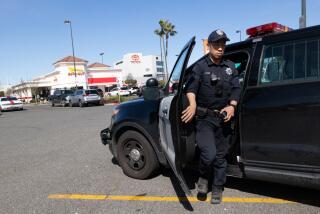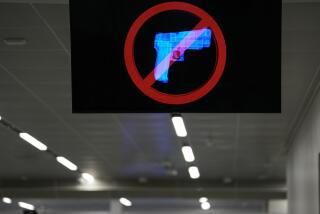Court Lets Police Stop People Who Run Away
WASHINGTON — People who suddenly run from police can be stopped and questioned, the Supreme Court ruled Wednesday, even if officers have no other reason to suspect them of wrongdoing.
An “unprovoked flight” when an officer or a police car approaches is suspicious behavior, the court said. And officers are free to make “common-sense judgments” when deciding whether to stop a fleeing suspect.
The 5-4 ruling makes it clear that police have broad leeway to patrol the streets and to stop and frisk people they deem suspicious. Critics have said that police in some cities, including New York, misuse this authority to aggressively stop and frisk black and Latino men.
But the court’s conservative majority refused to adopt a rule that restricts street stops to instances in which officers can point to specific evidence, such as seeing a gun or drugs.
Giving police freedom to stop pedestrians carries “the risk that officers may stop innocent persons,” Chief Justice William H. Rehnquist conceded in the majority opinion. But, if the person has done nothing wrong, he should soon be on his way, Rehnquist added.
For at least a decade, judges in California and elsewhere have been divided on how to view people who flee from police.
The 4th Amendment forbids “unreasonable searches and seizures.” Some courts have said that a presumably innocent person who runs from the police has committed no crime and that stopping that person therefore is an unreasonable search.
Others have said that a person fleeing from police is sufficiently suspicious to warrant a stop.
The issue came before the court in a Chicago case. Sam Wardlow was standing in front of a house one afternoon in September 1995 when four police cars turned the corner. The area was known for drug trafficking.
Wardlow broke into a run, but Officer Tim Nolan stopped him. Patting Wardlow down, Nolan found a loaded gun in the suspect’s pocket and arrested him for carrying a concealed weapon.
Illinois courts threw out the evidence and ruled that police had no authority to stop Wardlow. The Constitution gives people a “right to move on,” the state judges said.
Disagreeing, Rehnquist said that the law has allowed “brief, investigating stops,” so long as police have a “reasonable, articulable suspicion that criminal activity is afoot.”
A person’s “nervous, evasive behavior” is one factor that might justify a stop. “Headlong flight is the consummate act of evasion” and certainly gives an officer suspicion that something is wrong, he said.
His opinion (Illinois vs. Wardlow, 98-1036) was joined by Justices Sandra Day O’Connor, Antonin Scalia, Anthony M. Kennedy and Clarence Thomas.
Law enforcement officials in Los Angeles welcomed the decision, saying it clarifies the law. They did not expect it to lead to changes in pursuit policies, however.
Officers do not routinely chase all fleeing people, officials said, but they may do so if they suspect the individual is involved in crime.
“It happens all the time. Some kid just runs away from you and you don’t chase them,” said Capt. Garry Leonard, a spokesman for the Los Angeles County Sheriff’s Department.
It is common for teens, especially gang members, to flee deputies even if they have not done anything wrong, Leonard said.
But deputies can give chase “if they believe the person has participated in a criminal act or is fleeing the scene of a crime,” he added.
Los Angeles Police Department officers have “the option” to pursue someone who runs away, but they are not required to do so, said LAPD Cmdr. David Kalish.
“You cannot ignore human behavior in formulating reasonable suspicion, and unprovoked fleeing from police is one factor officers should use in determining reasonable suspicion for a detention,” Kalish said. “Our position is that the Supreme Court has followed common sense.”
Santa Monica Police Chief James T. Butts said that he is relieved by the ruling. Had the court adopted a rigid rule against pursuits, “it would have had a drastic impact on our ability to investigate evasive and suspicious behavior.”
*
Savage reported from Washington and Meyer from Los Angeles.
More to Read
Sign up for Essential California
The most important California stories and recommendations in your inbox every morning.
You may occasionally receive promotional content from the Los Angeles Times.










